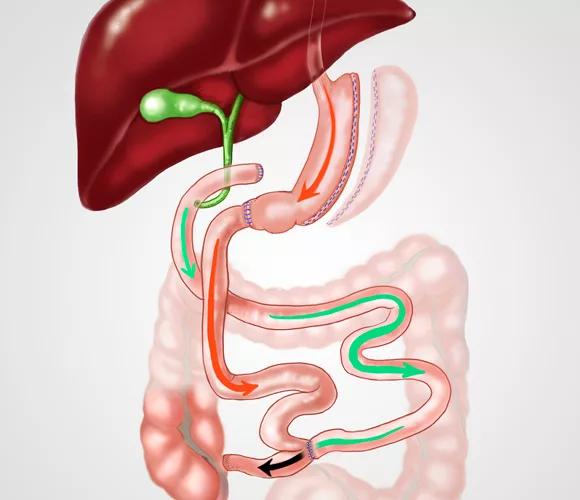Obesity and Metabolic Surgery
Bilio-Pancreatic Bypass

Principle
This technique is restrictive, with much malabsorption. It limits the quantity of food ingested and the assimilation of this food by the intestine.
It is considered to be the most effective but also exposes to the most severe complications, so it is proposed only exceptionally. It combines a gastrectomy sleeve with a major short circuit of the small intestine. Food is only digested by the digestive juices and assimilated over a short portion of the small intestine.
Features
This technique is indicated for very obese patients with a BMI > 60 kg/m2. It is performed by specialized teams.
How does the Operation take place?
The operation is performed by laparoscopy (5 to 6 small skin incisions are necessary).
The operation lasts between 4 and 5 hours. The duration of hospitalization is about a week.
Advantages
The weight loss is significant, about 90%, and long-lasting. The quality of life is average due to the partial digestion of food. The patient must be strictly monitored because of the high risk of deficiencies. Significant supplementation is necessary for life.
This intervention is exceptional.
Expected Weight Loss
The weight loss is significant and long-lasting, it is about 90% looking back over more than 10 years of outcomes.
Vitamin & Nutritional Deficiencies
Significant deficiencies in vitamin B12, vitamin D and iron; supplements are mandatory.
Deficiencies in vitamins B1, B6, C.
Usual nutritional deficiencies in protein to be supplemented.
Vitamin supplementation is nowadays recommended for life.
we help you achieve your weight-loss goals
The surgical management of obesity is based on 4 axes.
The surgical intervention, the preoperative and postoperative nutritional care, a preoperative and sometimes postoperative psychological assessment and follow-up, and a regular and sustained physical activity…